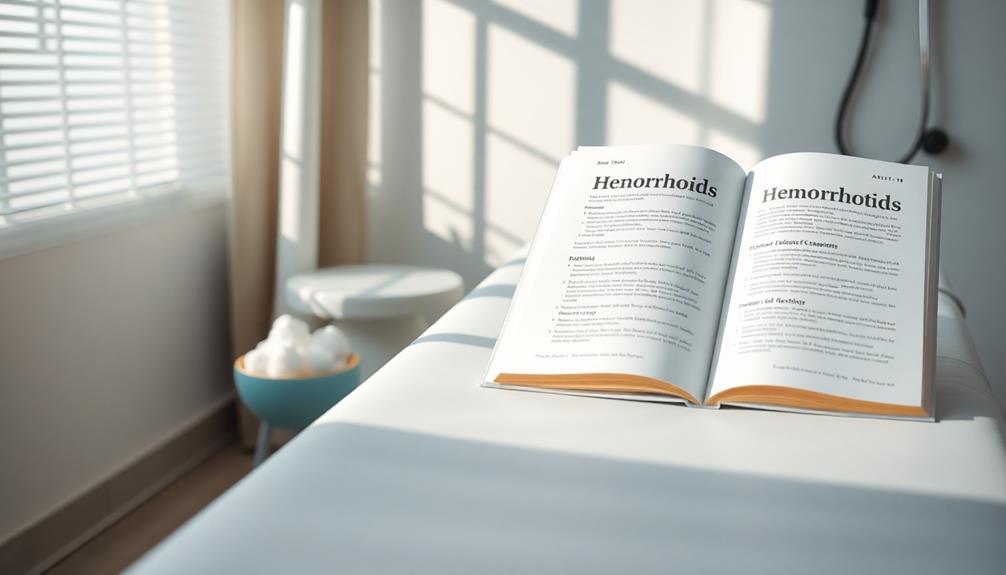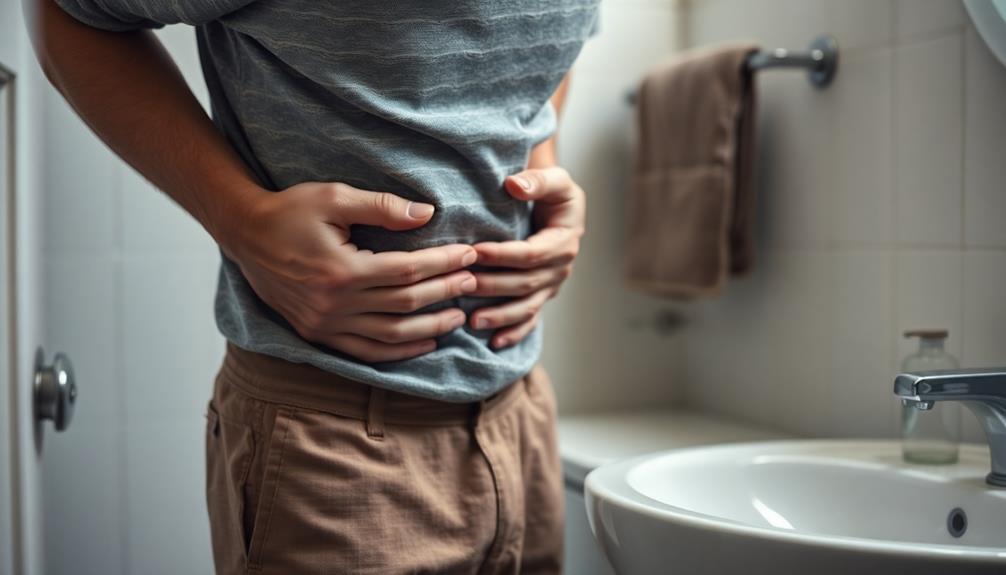Hemorrhoids themselves usually don't smell. However, if you notice an unpleasant odor, it might be due to poor hygiene or an infection. In some cases, mucus discharge from irritated hemorrhoids can produce a fishy scent, while infected hemorrhoids may emit a putrid smell. This can happen if you're experiencing leakage, especially with prolapsed hemorrhoids. Keeping the area clean is super important to avoid these odors, so gentle washing and staying dry can help. If you're curious about managing these symptoms better, there's plenty more to discover about keeping you comfortable and healthy!
Key Takeaways
- Hemorrhoids themselves typically do not produce a distinct odor unless complications such as infection occur.
- Inflamed hemorrhoids may emit a fishy smell due to mucus discharge or irritation.
- Infected hemorrhoids can generate a strong, putrid smell associated with tissue breakdown and pus formation.
- Fecal leakage from prolapsed hemorrhoids can contribute to unpleasant odors if hygiene is inadequate.
- Maintaining proper hygiene is crucial to minimize odors and prevent further complications related to hemorrhoids.
Introduction

Hemorrhoids are a common yet uncomfortable condition that can sometimes lead to unpleasant odors. You might notice a foul smell if complications arise, like an infection or mucus discharge. While hemorrhoids themselves don't usually emit an odor, inflamed ones can cause irritation in the anal area, leading to a fishy smell due to mucus leakage.
Understanding the importance of regular hygiene practices is crucial for managing discomfort and preventing odors.
If you experience prolapsed hemorrhoids, fecal leakage can hinder your ability to maintain proper hygiene, resulting in even more discomfort and odor. Infected hemorrhoids can produce a rotten or putrid smell from tissue breakdown and pus formation, which nobody wants to deal with.
To keep things fresh, it's essential to maintain regular hygiene practices, like cleaning the area gently after bowel movements and using suitable products to soothe irritation.
Paying attention to these habits can help you minimize any unpleasant smells associated with hemorrhoids. You deserve to feel comfortable and confident, so don't hesitate to seek help if you're facing issues.
Description of the Smell

When dealing with hemorrhoids, you might notice that the smell can vary significantly based on the condition's severity and any complications. Typically, hemorrhoids don't produce a noticeable smell. However, if complications arise, you could encounter unpleasant odors.
For instance, if you experience anal leakage, you might notice a strong odor caused by fecal matter. Maintaining good hygiene practices can help mitigate these odors, as poor hygiene may exacerbate the situation and lead to a more pronounced smell.
Mucus discharge from inflamed hemorrhoids can sometimes emit a fishy smell due to irritation and inflammation. If hemorrhoids become infected, they can produce a foul, putrid smell that's hard to ignore. This odor results from tissue breakdown and the presence of pus.
The intensity of these odors often depends on your hygiene practices and the severity of inflammation. If things get worse, you may find that hemorrhoid odor can smell bad enough to be concerning.
It's important to keep track of any changes in smell, as this might indicate a need for medical attention. Understanding these smells can help you feel more informed and proactive about your health.
If you notice anything unusual, don't hesitate to reach out to a healthcare professional for advice! If you want to learn about cold medications overview, it could provide additional insights on managing discomfort during health issues.
Source and Composition

The source of unpleasant odors associated with hemorrhoids often stems from various factors, including inflammation, infection, and hygiene practices. Typically, hemorrhoids don't have a distinct smell, but complications can change that. For instance, if inflammation or irritation occurs, mucus discharge may emerge, sometimes producing a fishy odor.
Maintaining good air quality is essential for overall health, and poor ventilation in living spaces can exacerbate discomfort associated with various health conditions, including hemorrhoids.
Poor hygiene can make things worse. When you're dealing with the pain of hemorrhoids, it's easy to neglect cleaning, which can lead to fecal odors. If hemorrhoids become infected, you might notice a putrid smell, indicating tissue breakdown or pus formation. This rotten odor signals that something needs attention.
In cases of prolapsed hemorrhoids, fecal leakage can happen, causing more unpleasant odors if not managed properly. Keeping everything clean and dry is essential to minimize these smells.
Typical Scenarios or Environments

Dealing with hemorrhoids can be particularly challenging in certain environments, especially those with limited access to hygiene facilities. Imagine being at a picnic or on a long road trip, and suddenly, you feel discomfort from inflamed hemorrhoids.
In such situations, maintaining cleanliness becomes difficult. If you can't clean around your anus properly, the risk of odor smell increases, and you might notice a foul-smelling odor due to anal discharge or even minor leakage from prolapsed hemorrhoids.
Infected hemorrhoids can also emit a putrid smell, making it even more uncomfortable. You might find yourself worrying about what others think, as the unpleasant odor could draw attention. Poor hygiene can exacerbate these issues, so finding a restroom becomes a priority.
If you're in a place without proper facilities, carrying wipes or a small bottle of water can help you stay clean and reduce the chances of any odor forming.
Emotional or Cultural Associations

Although many people experience hemorrhoids, the emotional and cultural associations tied to their odor can be overwhelming. The smell can trigger feelings of shame and embarrassment, largely due to societal beliefs about cleanliness and bodily functions. You might feel anxious discussing it, fearing judgment from others.
In many cultures, talking about health issues related to the anus is considered taboo, which can lead to isolation and emotional distress. Imagine being in a social situation where the topic arises. You might notice others shifting uncomfortably or avoiding the subject altogether.
These reactions can reinforce negative stereotypes about those who suffer from hemorrhoids, making you feel inadequate or ashamed. It's no surprise that the odor can impact your mental well-being and social interactions.
You're not alone in this experience; many share similar feelings. Understanding that these emotional responses are common can help reduce the shame and embarrassment surrounding hemorrhoids.
Health or Safety Considerations

When hemorrhoids flare up, it's crucial to take health and safety considerations seriously. You might notice some unpleasant odors, especially if there's an infection or fecal leakage involved. Inflamed hemorrhoids can lead to mucus discharge, which may have a fishy smell due to irritation.
Keeping your hygiene in check is vital, as poor practices can worsen any bad odor and lead to further complications. If you experience pain and discomfort, it's easy to overlook proper hygiene. However, neglecting this can lead to infections, which can emit a putrid or rotten smell due to tissue breakdown and pus formation.
If you have prolapsed hemorrhoids, they can prevent the anus from closing completely, increasing the risk of fecal leakage and associated odors.
It's essential to pay attention to your body. If you notice any changes in smell or experience severe pain, don't hesitate to seek proper medical advice. Addressing these issues early can help prevent more serious health problems.
Final Thoughts

Often, people overlook the importance of addressing the symptoms and hygiene related to hemorrhoids. If you notice foul odors, it's essential to understand that they often signal a problem. Infected hemorrhoids can create a putrid odor due to tissue breakdown, while swollen internal hemorrhoids might cause minor anal leakage, resulting in a fishy smell. This isn't just uncomfortable; it can affect your daily life.
To keep odors at bay, maintaining proper hygiene is crucial. Regular cleaning and warm baths help soothe irritation and minimize mucus discharge.
Remember, if you notice unusual smells, it could indicate infected hemorrhoids, so don't hesitate to seek medical advice.
Taking care of yourself is a priority! Simple steps can make a significant difference in your comfort and confidence. By staying proactive with your hygiene routine, you can help prevent unpleasant odors and enjoy a more pleasant experience.
Frequently Asked Questions
Do Hemorrhoids Give off an Odor?
Yes, hemorrhoids can give off an odor, especially if they're inflamed or infected. Poor hygiene or irritation might lead to unpleasant smells. Keeping the area clean can help you avoid these odors and discomfort.
How Do I Know if I Have a Hemorrhoid or Something Else?
To determine if you have hemorrhoids or something else, look for symptoms like pain, itching, or blood on toilet paper. If you notice severe pain or dark blood, seek medical attention immediately.
Do Hemorrhoids Leak Clear Fluid?
Yes, hemorrhoids can leak clear fluid, especially when inflamed. This leakage often occurs due to irritation, and you might notice it more with internal hemorrhoids. If it's significant, consult your healthcare provider for advice.
How Do I Know if I Have a Hemorrhoid or a Fissure?
To determine if you have hemorrhoids or a fissure, observe your symptoms. If you experience swelling and itching, it's likely hemorrhoids. If you feel sharp pain and see bright red blood, you might have a fissure.









